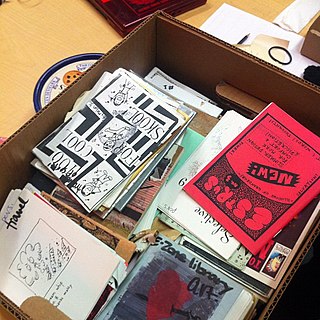
A fanzine is a non-professional and non-official publication produced by enthusiasts of a particular cultural phenomenon for the pleasure of others who share their interest. The term was coined in an October 1940 science fiction fanzine by Russ Chauvenet and first popularized within science fiction fandom, and from there the term was adopted by other communities.

A zine is a small-circulation self-published work of original or appropriated texts and images, usually reproduced via a copy machine. Zines are the product of either a single person or of a very small group, and are popularly photocopied into physical prints for circulation. A fanzine is a non-professional and non-official publication produced by enthusiasts of a particular cultural phenomenon for the pleasure of others who share their interest. The term was coined in an October 1940 science fiction fanzine by Russ Chauvenet and popularized within science fiction fandom, entering the Oxford English Dictionary in 1949.

A science-fiction fanzine is an amateur or semi-professional magazine published by members of science-fiction fandom, from the 1930s to the present day. They were one of the earliest forms of fanzine, within one of which the term "fanzine" was coined, and at one time constituted the primary type of science-fictional fannish activity ("fanac").

Eric Flint was an American author, editor, and e-publisher. The majority of his works are alternate history science fiction, but he also wrote humorous fantasy adventures. His works have been listed on The New York Times, The Wall Street Journal, The Washington Post, and Locus magazine best seller lists. He was a co-founder and editor of the Baen Free Library.

A science fiction magazine is a publication that offers primarily science fiction, either in a hard-copy periodical format or on the Internet. Science fiction magazines traditionally featured speculative fiction in short story, novelette, novella or novel form, a format that continues into the present day. Many also contain editorials, book reviews or articles, and some also include stories in the fantasy and horror genres.
Locus: The Magazine of The Science Fiction & Fantasy Field, founded in 1968, is an American magazine published monthly in Oakland, California. It is the news organ and trade journal for the English-language science fiction and fantasy fields. It also publishes comprehensive listings of all new books published in the genres. The magazine also presents the annual Locus Awards. Locus Online was launched in April 1997, as a semi-autonomous web version of Locus Magazine.

A fantasy fiction magazine, or fantasy magazine, is a magazine which publishes primarily fantasy fiction. Not generally included in the category are magazines for children with stories about such characters as Santa Claus. Also not included are adult magazines about sexual fantasy. Many fantasy magazines, in addition to fiction, have other features such as art, cartoons, reviews, or letters from readers. Some fantasy magazines also publish science fiction and horror fiction, so there is not always a clear distinction between a fantasy magazine and a science fiction magazine. For example, Fantastic magazine published almost exclusively science fiction for much of its run.
Planet Magazine is a free American online fantasy and science fiction magazine by emerging writers and digital artists. It was one of the first illustrated SF publications on the Internet, and has been continuously published since the January–March issue of 1994.

Shimmer Magazine was a quarterly magazine which published speculative fiction, with a focus on material that is dark, humorous or strange. Established in June 2005, Shimmer was published in digest format and Portable Document Format (PDF) and was edited by Beth Wodzinski. Shimmer featured stories from award-winning authors Jay Lake and Ken Scholes; comic book artist Karl Kesel also contributed artwork. The magazine ceased publication with issue 46 published in November 2018.

Jim Baen's Universe (JBU) was a bimonthly online fantasy and science fiction magazine created by Jim Baen. It was recognized by the SFWA as a Qualifying Short Fiction Venue. JBU began soliciting materials in January 2006 and launched in June 2006. The magazine contained around 120,000 to 150,000 words per issue. It closed in 2010.
Syne Mitchell is an American novelist in the science fiction genre. She has a bachelor's degree in business administration and master's degree in physics. She lives in Seattle, Washington and is married to author Eric S. Nylund. Her first science fiction novel was Murphy’s Gambit which won the Compton Crook Award in 2001. Followed by science fiction novels Technogenesis in 2001, The Changeling Plague in 2003, End in Fire in 2005 and the first installment of the Deathless series, called The Last Mortal Man in 2006.

M. K. Hobson is an American speculative fiction and fantasy writer. In 2003 she was a Pushcart Prize nominee, and her debut novel The Native Star was nominated for the 2010 Nebula Award. She lives in Oregon City, Oregon.
WillyCon was a regional science fiction and fantasy convention founded in 1999 and held annually until 2019. It was a general interest convention promoting science fiction, fantasy, and fandom in general. The convention was run by the Science Fiction and Fantasy Club of Wayne State College (WSC). It was the longest running fan-run convention of this type in northeast Nebraska.

Orion's Child Science Fiction & Fantasy Magazine was a fantasy and science fiction magazine first published in 1984 by Orion Press under the editorship of T. Joseph Cole. The magazine featured original fiction, art, and poetry. Though it included works by such prominent authors as Ray Bradbury and Richard L. Tierney, the original magazine produced only two issues. Recently, Orion's Child has been resurrected by the son, Gabriel M. Cole, of the original founder and editor, himself an aspiring writer.

A horror fiction magazine is a magazine that publishes primarily horror fiction with the main purpose of frightening the reader. Horror magazines can be in print, on the internet, or both.
Jeff Somers is an American science fiction author from New Jersey.
Electric Velocipede was a small press speculative fiction fan magazine edited by John Klima. Published from 2001 to 2013, Electric Velocipede won the Hugo Award for Best Fanzine in 2009.
Abyss & Apex Magazine (A&A) is a long-running, semi-pro online speculative fiction magazine. The title of the zine comes from a quote by Friedrich Nietzsche (1844-1900), "And if you gaze long into the abyss, the abyss gazes also into you." The stories and poetry therefore follow the pattern of "how would humans react?" if a new technology or a type of magic or supernatural power affected them.
Sandra Kasturi, is a poet, editor and publisher.

Fahrenheit is the oldest Polish literary e-zine which publishes literary works and literary criticism on science fiction, fantasy and horror fiction. It was established in 1997 by "Gin and Tonic", i.e., Polish authors Andrzej Ziemiański and Eugeniusz Dębski.









